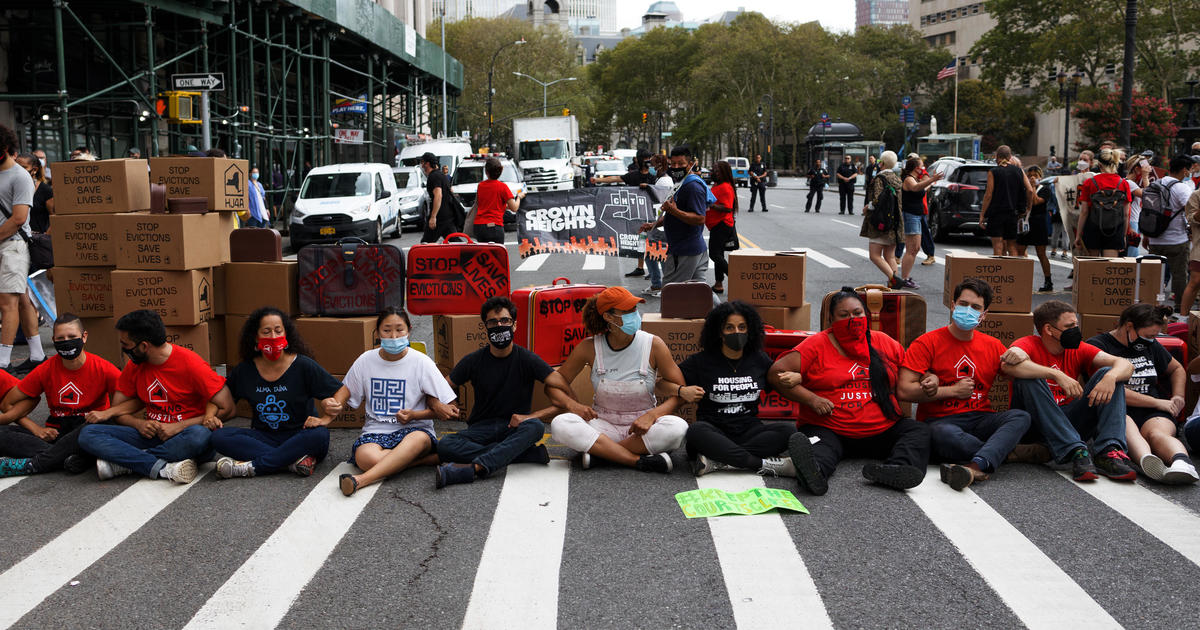
Now that the Supreme Court has struck down eviction protections for most of the U.S., as many as 3.5 million households are at risk of losing their homes, including hundreds of thousands of tenants this year alone, according to a Wall Street analysis.
That's because federal rent assistance has been agonizingly slow to make it to renters, with just 10% of available funding having gone out by the end of July. Another factor is that many tenants behind on rent are in large cities with tight housing markets, which makes them more likely to face eviction, Goldman Sachs analysts said Monday in a research note.
"The strength of the housing and rental market suggests landlords will try to evict tenants who are delinquent on rent unless they obtain federal assistance. And evictions could be particularly pronounced in cities hardest hit by the coronacrisis, since apartment markets are actually tighter in those cities," Goldman Sachs analysts wrote. "This reduces the incentive for landlords to negotiate with delinquent tenants or wait for federal aid."
Goldman Sachs researchers used figures from the Census Bureau and landlord trade groups to estimate that 2.5 million to 3.5 million households are behind on rent. About 2 million of those families live in properties owned by small landlords, the investment bank found.
While renters in a few large states, including California, Illinois and New York, are currently shielded from eviction under state laws, "roughly 90% of the country will lose access to these emergency protections by the start of the fourth quarter," Goldman said. The slow distribution of federal rent aid jeopardizes an additional 1 million to 2 million households once state protections expire, according to the analysis.
That means 750,000 households could be evicted later this year under current policy, the researchers wrote. Those evictions would also lead to 20,000 additional lost jobs, Goldman estimated.
Other estimates see the potential for even greater fallout from the Supreme Court blocking an eviction ban. The National Equity Atlas, a project of Right to the City and the University of Southern California, estimates that more than 6 million households were behind on rent as of early August.
One reason for the disparity is that a component of Goldman's estimates assumes a typical yearly eviction rate of 2.5%, which is common during periods of high employment and economic growth. If evictions approach their level during the Great Recession, hundreds of thousands more renters would likely lose their homes.
Biden administration officials urged states to impose their own eviction bans late last week. Gene Sperling, a senior adviser to President Joe Biden who is coordinating the American Rescue Plan, on Monday exhorted local community groups to move faster to disburse rent assistance funds and ease up on paperwork. Some programs have been bogged down with onerous application and documentation requirements.
"We need to speed up rent assistance everywhere," Sperling said. "There is an excessive caution and conservativeness among many of the grantees."
He contrasted the slow pace of providing rent assistance to millions of tenants with Paycheck Protection Program loans for small businesses, which allowed owners to qualify for large amounts of funding with minimal documentation.
"There are some times when you are talking with people who are running these programs, who are sincere, who are conscientious, but they are not treating it as the emergency that it is," Sperling said.
"lose" - Google News
September 01, 2021 at 06:31PM
https://ift.tt/3zO7vQx
With eviction moratorium gone, 3.5 million U.S. households could lose their home, Goldman Sachs estimates - CBS News
"lose" - Google News
https://ift.tt/3fa3ADu https://ift.tt/2VWImBB
Bagikan Berita Ini














0 Response to "With eviction moratorium gone, 3.5 million U.S. households could lose their home, Goldman Sachs estimates - CBS News"
Post a Comment